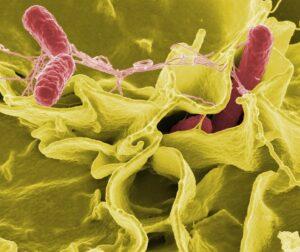The DNA segment responsible for the spread of antibiotic resistance has been identified in Salmonella
The researchers of the National Laboratory of Agricultural Biotechnology and Precision Breeding for Food Safety (Agrarian Biotechnology NL) have identified two DNA segments of the salmonella bacterium that are responsible for the spread of antibiotic resistance among bacteria – the Hungarian Research Network (HUN-REN) informed the MTI on Wednesday.

(Photo: Pixabay)
One of the most significant problems in human and animal health is the rapid spread of antibiotic resistance, and the researchers of the NL Microbiology section of Agricultural Biotechnology are involved in solving this problem. Recently, they managed to identify two DNA sections in the genetic material of the resistant intestinal bacterium Salmonella, through which the genes causing resistance are transferred to the cells of other bacterial species, thus spreading antibiotic resistance in bacteria – read the announcement. In another research conducted in the laboratory, the researchers of the Plant Biotechnology Section of the Agricultural Biotechnology NL are working on the development of effective and safe plant breeding technologies and the creation of food and fodder plant varieties – wheat, barley, corn and potatoes – that are resistant to diseases and extreme environmental factors. noting that the climate crisis, the spread of diseases and pests, and the lack of water threaten safe food production worldwide. rt According to the report, the selection and mutation of the target genes for the production of potato varieties resistant to the quarantine bacterium (Ralstonia solanacearum), which also causes plant death, and the phytophthora fungus, which causes potato blight, have already taken place, and resistance testing is in progress. In order to produce eared grain varieties resistant to fungal pathogens – powdery mildew and fusarium – the researchers developed a genome editing system that enables the creation of precise mutations in wheat without the introduction of foreign genes. In the Animal Biotechnology section, precision breeding procedures are developed for mammals and birds. The primary goal is to create useful gene variants contributing to food safety and resistance to mycotoxins by optimized editing of several selected genes. During the work, the researchers were able to identify several monooxygenase enzymes involved in the detoxification process in rabbits, which may play a role in the breakdown of mycotoxins.
The research project is implemented in the Széchenyi Terv Plusz Program with the help of a HUF 2.431 billion non-refundable European Union grant
The National Laboratory for Agricultural Biotechnology and Precision Breeding for Food Safety began its operations in 2022. At the center of the national laboratory, realized in the consortium of the HUN-REN Agricultural Science Research Center (HUN-REN ATK), the Hungarian University of Agricultural and Life Sciences (MATE) and the HUN-REN Szeged Biological Research Center (HUN-REN SZBK), is the microbe-plant-animal system complex research. Innovative precision breeding technologies are being developed in the field of plant and animal biotechnology, which can be used to efficiently and safely create targeted genetic changes without the introduction of foreign genes, the announcement said.
MTI
Related news
MDOSZ: Food safety precautions during the heat wave
The National Association of Hungarian Dietitians (MDOSZ) specifically warns of…
Read more >AM: cultivating home gardens is a useful and value-creating activity
Home gardens are important in the production of quality food,…
Read more >More scholarship students completed their agricultural studies in Hungary
The students of the scholarship program jointly supported by Hungary…
Read more >Related news
Valeo Foods Completes Acquisition Of Appalaches Nature
Valeo Foods Group has completed the acquisition of Appalaches Nature,…
Read more >Carrefour grows in France and Brazil, lags behind in rest of Europe
Carrefour says it is rather pleased with its financial results…
Read more >Food and beverage innovation plunges nearly 50% since 2007: Mintel
The market research firm said about a quarter of items…
Read more >








